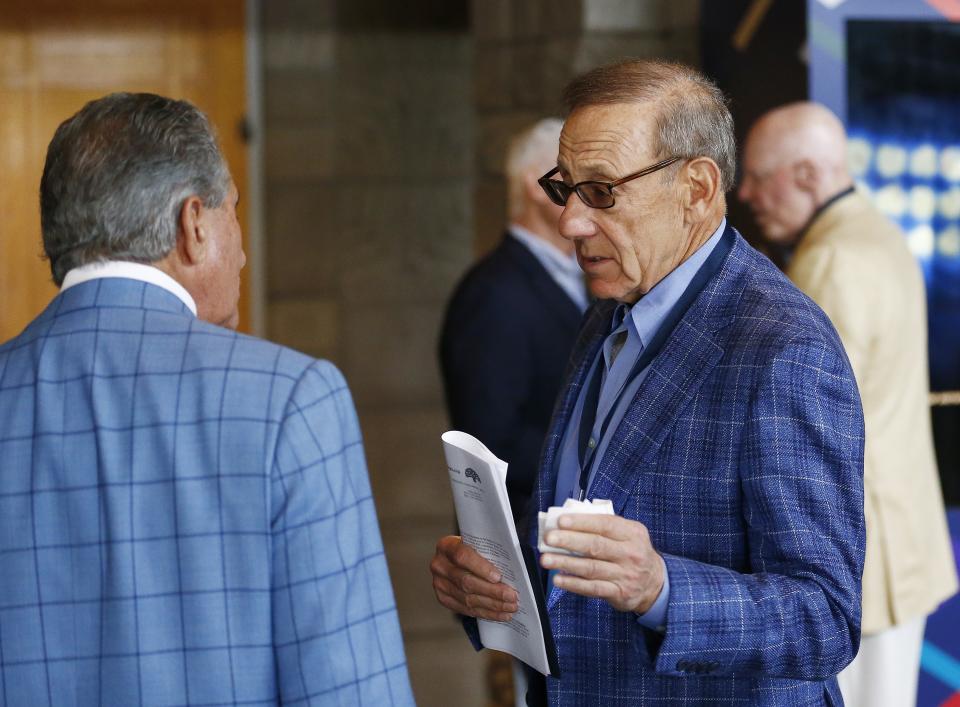Sources: Dolphins owner Stephen Ross deposed in Colin Kaepernick grievance
Miami Dolphins owner Stephen Ross was the latest NFL owner to be deposed in the Colin Kaepernick grievance, less than two months after Ross tied the league’s thought process on player protests to the political saber-rattling of President Donald Trump.
Ross’ deposition took place Tuesday, sources familiar with the grievance told Yahoo Sports. It made him at least the third NFL team owner to sit for questions in the process. The Dallas Cowboys’ Jerry Jones and Houston Texans’ Bob McNair have also been deposed in the case, as well as NFL commissioner Roger Goodell and Baltimore Ravens coach John Harbaugh and general manager Ozzie Newsome.
While the substance of Ross’ deposition is sealed, it’s believed the proceedings were aimed at dissecting recorded statements Ross made to the New York Daily News in early March in which he indicated the NFL’s perspective on players kneeling during the national anthem was directly influenced by Trump. Specifically, Ross was recorded saying that his personal view on kneeling as a form of protest against racial and social injustice changed in relation to Trump’s framing of the act as being anti-military. On its face, such an admission could provide Kaepernick’s legal team with a solid foundation in efforts to prove Trump directly influenced the quarterback’s employment status.
As Ross told the Daily News in March, “I think initially I totally supported the players in what they were doing, because it’s America – people should be able to really speak about their choices and show them [in] doing that. But I think when you change the message, about, is it support of our country or the military, it’s a different message. When that message changed, and everybody was interpreting it as that was the reason, then I was against the kneeling.”

“[Trump’s] message became what kneeling was all about,” Ross continued. “From that standpoint, that’s the way the public is interpreting it. So I think that’s really incumbent upon us to adopt that, because that’s how I think the country is now interpreting the kneeling issue.”
If Kaepernick’s lawyers are building their case to prove Trump had influence over the NFL, Ross’ statement is arguably the most unambiguous that any owner had made in that regard. It could make his deposition only slightly less pivotal than that of the Cowboys’ Jones, who had direct conversations with Trump about player protests and the NFL.
Ross’ continued inclusion in the deposition process is a strong indication that Kaepernick’s legal team doesn’t appear to be relenting on making Trump a sizable part of the collusion allegation against the league. That would also explain why New England Patriots owner Robert Kraft also continues to be on the deposition list, despite the Patriots never being in play for Kaepernick’s services.
Kraft’s existence on the deposition list is at least partially believed to have roots in his appearance on Air Force One with Trump on March 19, 2017. The two shared a flight one day before the President made a speech in which he appeared giddy at the thought that NFL owners were scared to sign Kaepernick because of the president’s potential scorn.
“Your San Francisco quarterback, I’m sure nobody ever heard of him,” Trump said to a crowd in Kentucky on March 20. “… There was an article today that was reported, that NFL owners don’t want to pick him up because they don’t want to get a nasty tweet from Donald Trump. Do you believe that? I just saw that.”

That moment would ultimately be a precursor to Trump making Kaepernick a consistent subject when speaking to his political base. He’d take that political rhetoric further the following September, when he railed against kneeling as an affront to national patriotism.
“Wouldn’t you love to see one of these NFL owners, when somebody disrespects our flag, to say ‘Get that son of a bitch off the field right now. Out! He’s fired. He’s fired!” Trump said in September.
Finally, in October, Trump went further, delving deeper into Kaepernick’s kneeling and how it should have impacted the quarterback’s job status.
“I watched Colin Kaepernick [in 2016], and I thought it was terrible, and then it got bigger and bigger and started mushrooming, and frankly the NFL should have suspended him for one game, and he would have never done it again,” Trump said in an interview with Fox News’ Sean Hannity. “They could have then suspended him for two games, and they could have suspended him if he did it a third time, for the season, and you would never have had a problem. But I will tell you, you cannot disrespect our country, our flag, our anthem. You cannot do that.”
With all of those statements viewed inside of the context of what Ross told the Daily News about Trump realigning his own perspective on kneeling, it creates potentially connective tissue between Kaepernick’s employment, the NFL and the president’s influence. Whether that will ultimately be enough to prove some kind of collusion remains to be seen.
The depositions are expected to roll on after this week, with Kraft and others still in line for their day with Kaepernick’s legal team.
More from Yahoo Sports:
• Golf club calls cops on black female members
• Falcons fans panic after Julio Jones’ social media purge
• Romney joins Utah fans heckling Westbrook
• Coach Carroll open to Seahawks signing Kaepernick

 Yahoo Sport
Yahoo Sport 





































